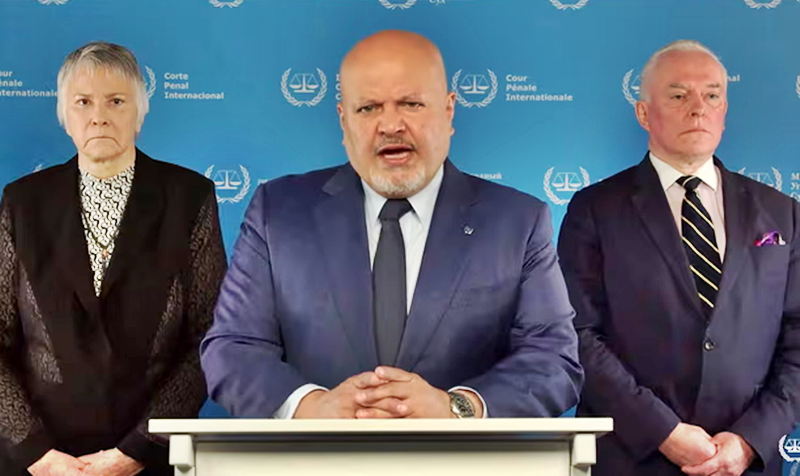The ICC arrest warrants for top Israeli officials are a step toward justice

By Guardian-Kenneth Roth-Tue 26 Nov 2024 11.00 GMT
The warrants for Netanyahu and Gallant are also a reminder to governments arming Israel as it commits war crimes in Gaza.
The international criminal court’s issuance of arrest warrants for the Israeli prime minister, Benjamin Netanyahu, and former defense minister Yoav Gallant is an important step toward justice for the Palestinian people, who too often have known only injustice. The court allows charges to move forward for war crimes and crimes against humanity focused mainly on the Israeli strategy of starving the civilians of Gaza and depriving them of medical and other necessities. The arrest warrants will make the world much smaller for these senior Israeli officials.
The Israeli government had advanced two principal arguments in the hope of avoiding the warrants, both of which the court rejected. First, Israel contended in essence that Palestine was not enough of a state to join the court and confer jurisdiction for crimes committed on its territory. The court reaffirmed a prior ruling finding that Palestine’s status as a non-member observer state of the United Nations general assembly enabled it to ratify treaties such as the ICC’s Rome statute.
The Israeli government also invoked what is known as the “principle of complementarity”, the rule that the court must defer to good-faith national efforts to investigate and prosecute crimes. But the court rightly noted that there is no such Israeli effort – no announced investigation into the starvation and deprivation strategy, no formal request to the prosecutor to defer his case for this (non-existent) national effort.
The Israeli government responded to the court’s ruling with the usual diversionary vitriol. It ran through a litany of excuses – the need to liberate the hostages held by Hamas, Hamas’s use of human shields, Israel’s democracy, Israel’s right of self-defense, the ICC’s supposed bias and antisemitism – all utter irrelevancies.
Such beside-the-point “defenses” would be laughed out of court were Netanyahu or Gallant ever to stand trial. The charges they face are not about whether Israel should be fighting Hamas but how it is waging that war. Nothing justifies pursuing a war-crime strategy.
If Netanyahu or Gallant think they have a serious defense, they should voluntarily show up in The Hague and assert their intention to mount it. That is not so far-fetched. It is what the Kenyan president Uhuru Kenyatta did. In light of his voluntary appearance, the court never imprisoned him but allowed him to continue serving as president while he contested the charges.
But Netanyahu and Gallant have no defense. The obstruction of humanitarian aid to Gaza has been widely documented and is readily apparent in the suffering of the Palestinian civilians of Gaza. Suddenly, 124 nations of the world – the countries that have joined the court – are off limits if these Israeli officials want to avoid arrest. Even Germany, a reflexive defender of the Israeli government because of its Nazi past but also a strong upholder of the rule of law and a central architect of the court, will be obliged to signal that these accused war criminals are unwelcome.
Israeli generals must now think twice about proceeding with the bombing and starving of Palestinian civilians. These charges are clearly only a first round. Karim Khan, the ICC chief prosecutor, probably chose to await the court’s ruling on the Israeli challenges before issuing additional charges. Khan has already signaled that his next target may be Israel’s repeated dropping of massive 2,000-pound bombs in heavily populated Gaza – clearly indiscriminate and disproportionate attacks.
For Russia’s war crimes in Ukraine, Khan has already begun to work his way down the chain of command, from Putin to four Russian commanders, for the crime of attacking electrical infrastructure. If Israeli generals don’t want to be added to the court’s docket, they had better start resisting illegal orders from the top.
The answer to the ICC charges should not be to attack the court but to end the conduct that has forced it to act
The arrest warrants are also a reminder to governments that continue to arm the Israeli military as it commits war crimes in Gaza. The former Liberian president Charles Taylor is serving a 50-year sentence in a British prison for aiding and abetting war crimes by providing arms to an abusive rebel force in Sierra Leone. Do British, German or American officials want to face similar charges?
Those charges could already have been issued, but I suspect that Khan has proceeded with political prudence, not wishing to take on senior western leaders when there is so much else on his plate. But it is not difficult to imagine one scenario that might lift that self-restraint.
Donald Trump during his first term outrageously imposed sanctions on the prior ICC prosecutor, Fatou Bensouda, and one of her deputies for merely opening an investigation in Palestine that might lead to charges against Israeli officials as well as one in Afghanistan that might have implicated the George W Bush-era torturers there. The Biden administration lifted those sanctions.
Already the new US Senate majority leader, John Thune, has threatened to revive similar sanctions. If Trump again succumbs to such an effort to manipulate an independent institution of justice, I would not anticipate restraint on the part of Khan.
Trump might pretend to slough off accusations of aiding and abetting Israeli war crimes in Gaza, but he does not have the power to pardon ICC charges. Suddenly he would face the same travel restraints as Netanyahu and Gallant – not so much that the handcuffs would be placed on him as he landed in Brussels, São Paulo, Johannesburg or Tokyo, but that he would be quietly told not to come.
It is time to move beyond the reflexive attacks on the ICC by Israel’s defenders and to re-examine what is really at stake. As Khan has noted, we should be thinking foremost of the victims. The answer to the ICC charges should not be to attack the court but to end the conduct that has forced it to act. That is the best response for Palestinian civilians and for people worldwide – in Sudan, Myanmar, Ukraine and a host of other countries where abusive commanders have taken heart from America’s inexcusable defense of Israeli war crimes in Gaza.

- Kenneth Roth, executive director of Human Rights Watch from 1993 to 2022, is a visiting professor at Princeton’s School of Public and International Affairs
